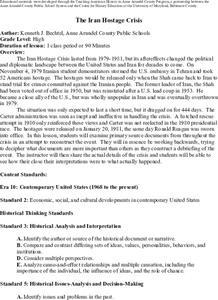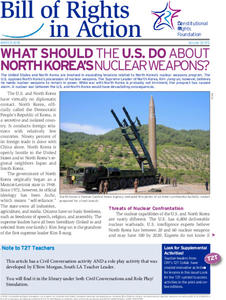Center for History Education
The Iran Hostage Crisis
While the Iranian Hostage Crisis was a watershed moment, few history classes take on the complex series of events leading up to it. Using declassified documents, including a hostage's diary, young historians create their own reports to...
Center for History Education
Debating Social Security: Understanding and Evaluating the Social Security Act of 1935
With throngs of Americans out of work and hungry, Franklin D. Roosevelt made the bold move to establish a social safety net with programs such as Social Security. The move was—and still is—controversial. Using documents from the 1930s,...
National Endowment for the Humanities
Creating the Office of the Presidency
The United States needed an executive power, but it wanted to avoid a monarchy. Using James Madison's notes on the Constitutional Convention, young historians look at the juggling act the Founding Fathers did to create a role for the...
National Endowment for the Humanities
The Question of Representation at the 1787 Convention
While the Constitution is considered enshrined today, its current form is the result of haggling at a secret convention in 1787. Using transcripts from the meetings and various plans as drafted by the delegates, class members unpack the...
National Endowment for the Humanities
The Road to the Constitutional Convention
After defeating the most powerful nation in the world, the United States had to deal with its own weaknesses in the Articles of Confederation. Activities in the lesson include analyzing primary sources from the Founding Fathers to...
Constitutional Rights Foundation
What Should the US Do About North Korea's Nuclear Weapons?
North Korea, a shadowy nation distrustful of America, is working on a nuclear weapons program. What should the United States do? The question has plagued American presidents for years, but now young scholars get to make their...
Stanford University
King Philip's War
King Philip's War was the crescendo of a violent period between the Pequot and English colonists. Using documents from English settlers, including a contemporary report on the conflict, learners explore the little-known period. They then...
Stanford University
Boston Massacre
The Boston Massacre was a propaganda victory for those protesting British rule over the American colonies. By using images from Patriots, as well as the testimony of witnesses, scholars consider what may have happened on that fateful day...
iCivics
DBQuest: The Nashville Sit-In Movement
What was it like to be a part of the sit-ins during the Civil Rights Movement? Learners consider the question and whether the protests were effective using an online documents-based investigation. The program allows for virtual...
Cornell College
Dred Scott v. Sandford Supreme Court Decision
Dred Scott was a harbinger of the Civil War. An enslaved man claimed freedom because his owner had taken him into free territory. Not only did the Supreme Court rule that Dred Scott and his wife were to remain enslaved, but it also ruled...
American Psychological Association
Developing Adolescents
Why to young people act the way they do? Scholars investigate the stages of adolescent development incorporating high school psychology techniques. Using research from the American Psychological Association, they uncover the five areas...
American Psychological Association
How Psychology Benefits Society
How do people form their opinions about certain social issues? Scholars research current global issues to find out how psychology plays a role in swaying thoughts. Using blogs, writings, and presentations, they uncover why people think...
Curated OER
Centers of the Storm: The Lyceum and the Circle at the University of Mississippi
Greek Revival architecture and the Civil Rights Movement? Sure! Examine how the Lyceum and Circle, two historic buildings located on the campus of the University of Mississippi, relate to integration and the 1962 riot on the university...
Beacon Learning Center
Growth of a Revolution-The Industrial Revolution
How did changes of the agricultural revolution in eighteenth century Great Britain influence the Industrial Revolution that followed? How were inventions and processes of the Industrial Revolution interrelated? This resource includes a...
Digital History
Jeffersonians in Office
If you're looking for a description of the major happenings of the presidencies of both Thomas Jefferson and James Madison, then this is the resource for you. Similar to a textbook reading, this worksheet offers a great deal of...
National Park Service
Freedom at Antietam
Explore how the issuance of the Emancipation Proclamation affected everyday individuals in the Civil War era. Learners are given the opportunity to read and evaluate primary and secondary source material, and then to compose a writing...
National Endowment for the Humanities
The Debate in the United States over the League of Nations: Five Camps: From Voices of Consent to Voices of Dissent
Learners explore and discuss Woodrow Wilson's concepts for peace and the League of Nations. They understand efforts made to foster American support for the League and discuss the opposition shown in the Senate.
National Endowment for the Humanities
Slavery and the American Founding: The "Inconsistency Not to Be Excused"
High schoolers examine slavery in the revolutionary and colonial eras of the United States. In this slavery lesson, students investigate the presence of slavery in early America, the language of the Constitution, and the intent of the...
National Endowment for the Humanities
Lesson 3: Religion and the Fight for American Independence
Pupils explore the role religion played in the American Revolutionary War. Using primary documents and writing exercises, high schoolers understand how religion was used in support of the war efforts and how specific religious groups...
National Endowment for the Humanities
Lesson 2: The Debate in Congress on the Sedition Act
Pupils research and discuss the provisions in the Constitution that supported the arguments for and against the Sedition Act. They articulate objections to and arguments in favor of the Sedition Act.
George Mason University
George Mason University: Digital History: A Guide
A detailed guide on how to research and plan a historical project using the Internet and its vast resources. Some of the topics explored are: how to design a website copyright law, how to digitize materials and much more.
Library of Congress
Loc: Primary Sources by State
An interactive map to search for extensive collections of primary sources for each of the United States.
Library of Congress
Loc: For Teachers: Analyzing Primary Source Documents
These student worksheets and activities help students analyze many different types of primary source documents. Life histories, objects, and photographs are all used to engage students.
Library of Congress
Loc: How to Find a Novel,etc. Without Knowing Its Title or Author
Use this guide to help identify a literary work when they know only its plot or subject, or other textual information such as a character's name, a line of poetry, or a unique word or phrase. Trusted databases, library catalogs, and more...

























